Social entrepreneur and author Matt Tenney spent roughly an hour inside a Business and Aerospace Building classroom recently giving a captive audience of MTSU management students his compelling arguments for and answers to their questions about servant leadership.
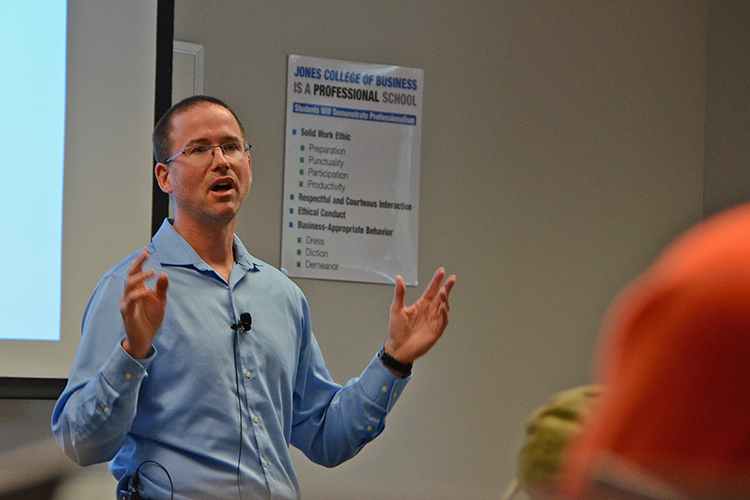
Social entrepreneur and author Matt Tenney talks to MTSU management students about the value of servant leadership during a guest lecture Thursday, Oct. 17, inside the Business and Aerospace Building classroom. (MTSU photo by Jimmy Hart)
Tenney, founder and CEO of the Nashville-based marketing firm The Generous Group and author of “Serve to Be Great: Leadership Lessons from a Prison, a Monastery, and a Boardroom,” shared his story about getting caught trying to defraud the U.S. government 17 years ago, leading to a five-year prison sentence and an embrace of monastic practices during that time that guide his leadership philosophy.
He believes business leaders can have lasting success “by focusing on serving and inspiring greatness in the people around them,” pointing throughout his talk to the example of the late Herb Kelleher, beloved co-founder of Southwest Airlines who died in January and “never laid off an employee.”

Dr. Kristie Abston

Dr. Leigh Anne Clark
An upper level principles of management class taught by assistant professor Kristie Abston was joined by a nonprofit class taught by associate professor Leigh Anne Clark to hear Tenney, who told the group a recent study estimated the lifespan of the average S&P 500 company at 20 years.
The reason? Tenney said part of it is that the traditional mindset causes people to go into business with making money as the ultimate motive, even if they care a lot about helping people. In doing so, they lose influence with their employees.
“Making profit the top priority pretty much guarantees the premature death of the organization,” he said. “When leaders make profit their top priority, they will either consciously or unconsciously neglect their employees. And when employees are continuously neglected, they become increasingly disengaged over time.”
That leads to poor customer service and product quality, and “innovation is much less likely to occur,” Tenney added. “The great leaders … see their top priorities like this: Above all else, love employees. … By love, I mean doing whatever we can to improve the long-term well-being of our team members (both professionally and personally).”
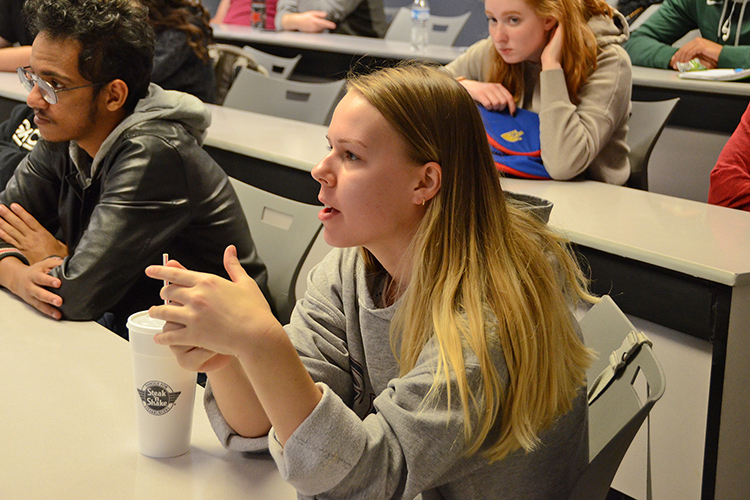
MTSU management students ask questions of social entrepreneur and author Matt Tenney following his guest lecture about the value of servant leadership Thursday, Oct. 17, inside the Business and Aerospace Building classroom. (MTSU photo by Jimmy Hart)
Following his talk, Tenney answered a number of student questions, ranging from how to properly show love to employees to determining adequate employee compensation to aligning your values with a prospective employer.
“They key point I want to make is that it’s actually much, much better — not just living a happy, fulfilling life, but that it’s much better for business — if you prioritize the well-being of the people you work with ahead of short-term metrics like quarterly profits, expenses, and those type of things,” Tenney said in an interview before his presentation.
 MTSU student Boyd Williamson, a junior management major from Houston, Texas, said it “was fantastic” hearing Tenney’s firsthand experience with developing his views on servant leadership. The lecture made him think about reading Tenney’s books on mindfulness and “looking more into servant leadership to see what I can do better.”
MTSU student Boyd Williamson, a junior management major from Houston, Texas, said it “was fantastic” hearing Tenney’s firsthand experience with developing his views on servant leadership. The lecture made him think about reading Tenney’s books on mindfulness and “looking more into servant leadership to see what I can do better.”
“To have someone to come out and say, ‘this is an example, this has actually worked, this is what I’ve done’ … was really cool,” Williamson said. “He explained it really well, was clear and concise, but he also had great comments and answered our questions really well.”
Williamson said he is open to becoming an entrepreneur or finding a place within management at an established company once he graduates, while understanding that the everchanging economy will likely require him to work at several companies throughout his professional career.
“It means having a mindset about your core values and what you want to stand for and being able to move forward” on your career path, he said.
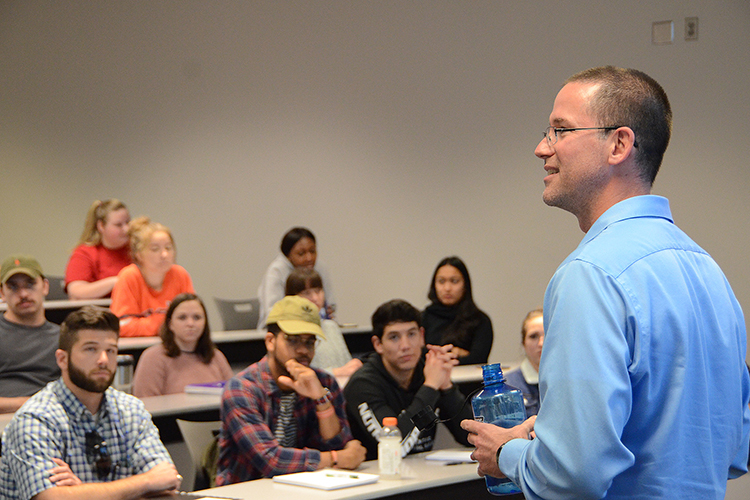
Social entrepreneur and author Matt Tenney talks to MTSU management students about the value of servant leadership during a guest lecture Thursday, Oct. 17, inside the Business and Aerospace Building classroom. (MTSU photo by Jimmy Hart)
Professor Jill Austin, chair of the Management Department, said Tenney’s insights directly address a primary topic in a class that deals with leadership and leadership strategies.

Dr. Jill Austin
“Anytime they can hear from someone out in the business world doing leadership work and consulting work, we think it’s a good thing … to hear the practical experiences that he brings to leadership,” she said. “At the Jones College of Business, we like to bring in speakers who do the work that we’re speaking about.”
“Servant leadership is very much on the minds of leaders today,” Austin added. “It’s not just about telling people what to do, giving directions and orders, it’s about getting a team to work together effectively and efficiently, trusting each other and having the authority to make their own decisions.”
— Jimmy Hart (Jimmy.Hart@mtsu.edu)
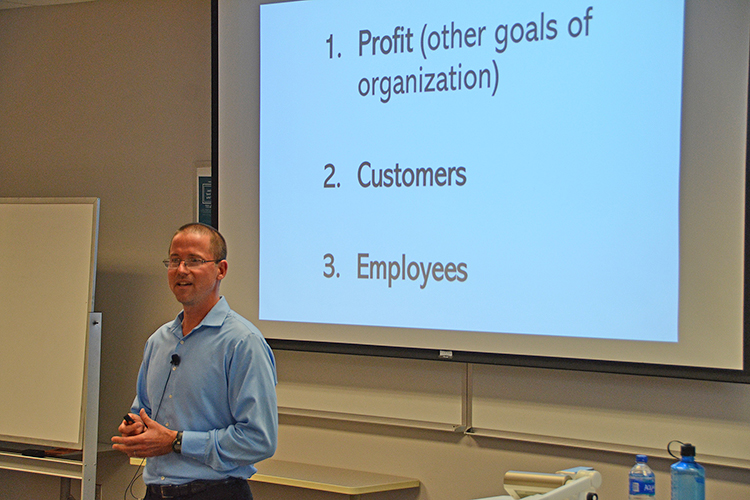
Social entrepreneur and author Matt Tenney talks to MTSU management students about the value of servant leadership during a guest lecture Thursday, Oct. 17, inside the Business and Aerospace Building classroom. The slide behind him shows the traditional approach to business where profit is the top priority. Tenney told students that employees should be at the top instead and the profits will follow. (MTSU photo by Jimmy Hart)
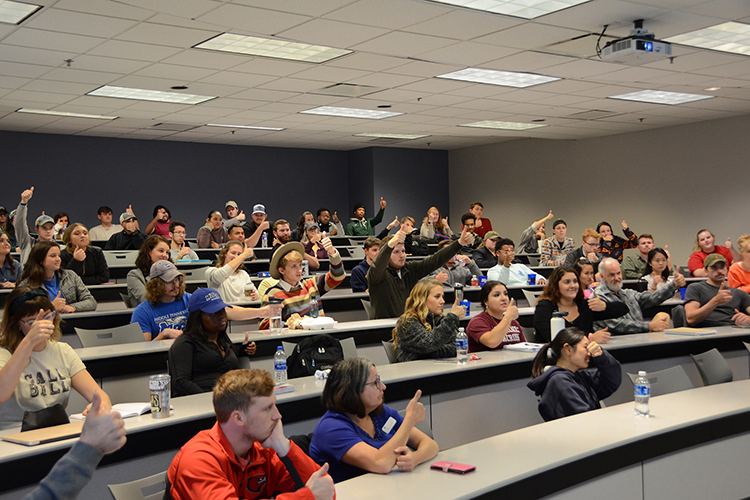
MTSU management students respond to a question from social entrepreneur and author Matt Tenney, who was giving a guest lecture about the value of servant leadership Thursday, Oct. 17, inside the Business and Aerospace Building classroom. (MTSU photo by Jimmy Hart)
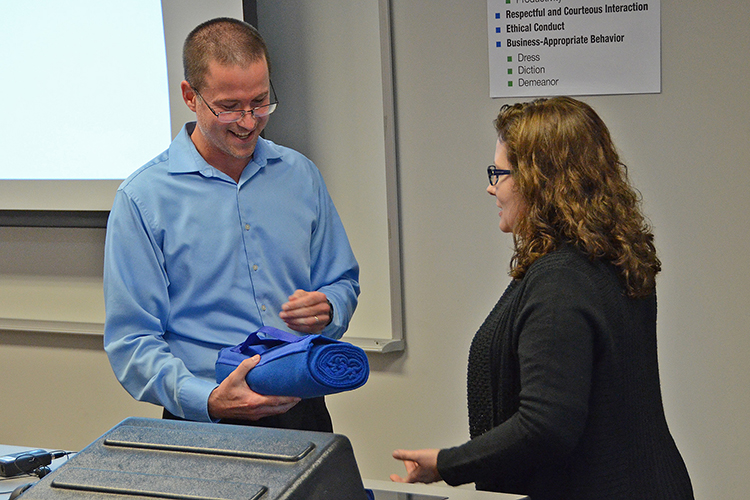
Social entrepreneur and author Matt Tenney, left, accepts a thank you gift from assistant professor Kristie Abston following Tenney’s guest lecture on the value of servant leadership to MTSU management students Thursday, Oct. 17, inside the Business and Aerospace Building classroom. (MTSU photo by Jimmy Hart)

COMMENTS ARE OFF THIS POST